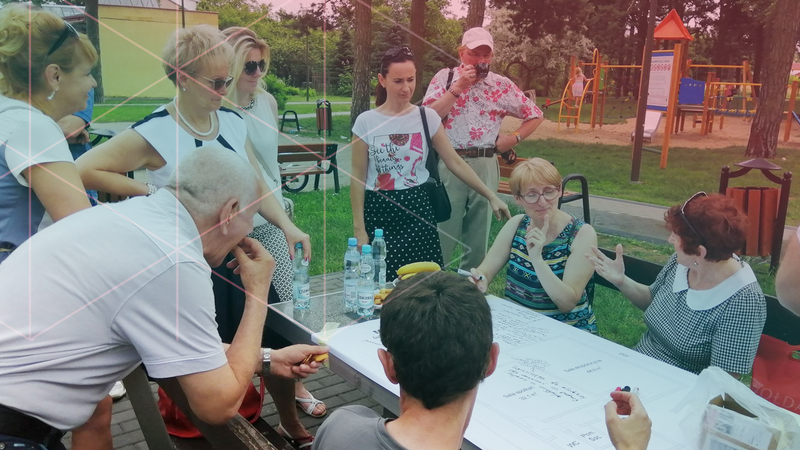Civic Europe
Civic Europe is an incubator for locally rooted civic initiatives, organizations and individuals in Central, Eastern and Southern Europe realized by commit by MitOst and Sofia Platform Foundation, funded by Stiftung Mercator.
We need active citizens
In times of polarization, deep political divisions and declining trust in democracy, civic cohesion is at stake. To tackle these societal challenges, we believe that Europe needs active citizens from different backgrounds engaged in open civic spaces to build the stronghold of our democracies. Only a vibrant and diverse civil society lives up to the potential that the core idea of democracy holds: co-creating our own future and having agency to influence our collective lives.
Civic Europe supports individuals, initiatives and civil society organizations in the regions of Central, Southern and Eastern Europe challenged by low civic literacy and a lack of civic infrastructure and aim to strengthen civic cohesion and active citizenship in their communities. We offer them mentoring and funding to implement their project ideas and to foster and promote their civic activities in the region. Civic Europe is a multi-level enabling framework that supports locally rooted organizations and projects.

Our support comes in two ways:
The Idea Challenge funds and mentors up to 20 ideas per year. Eligible countries are Bulgaria, Czech Republic, Croatia, Greece, Hungary, Italy, Poland, Portugal, Romania, Slovakia, Slovenia and Spain. Winning projects of the Idea Challenge build bridges and function as bright horizons and inspiration for bringing people together in times of segregation and animosity.
The Capacity Building program fosters the capacity and the ecosystems of locally rooted organizations and individuals active in the fields of civic education and civic engagement. It helps them establish themselves as actors in their communities by providing learning spaces and seed project funding in Bulgaria, Hungary, Poland and Romania. It is co-created and implemented with local partners.
We focus on the local level
Most regions outside capitals and large urban centers are characterized by low civic cohesion. In our understanding, civic cohesion is comprised of civic infrastructure and civic literacy. Civic infrastructure concerns civic spaces; those places where people meet, exchange and act on their local concerns. Civic infrastructure also has to do with civil society – in these places, civil society is usually weak; organizations are small in number and size, with limited funding and organizational skills. Many citizens there have low civic literacy – they lack the knowledge, skills and competences to be active in the local community.
It is at this level and in these places that we believe change happens first. On the local level people carry the greatest potential to identify challenges; they also have almost everything needed to tackle them. We believe that with the support of local partners we can help these pockets in Europe to increase the civic capacities of the citizens and the communities. This is why the focus of the program is locally rooted individuals, organizations and projects invested in supporting democracy from within.
Civic Europe glossary
Active citizenship is the civic involvement of individuals in social and political life and includes collective and individual actions defending common interests.
Civic cohesion is what we call the (aspired) state of a community that has:
- possibilities for social and political engagement (active citizenship),
- access to civic education such as democratic knowledge, skills, attitudes and values (civic literacy),
- civic infrastructure, like civil society organizations, networks, meeting spaces, community centers, libraries, museums, access to policy-making processes (civic infrastructure),
- trust, acceptance, solidarity and connectedness among groups and individuals in the community (social cohesion).
Civic education equips citizens with the competences that enable them to actively participate in society. These civic competences are 1) knowledge (concepts of democracy, equality, institutions, identity, politics), 2) skills (communication, discussion culture, thinking critically, problem solving, (self-) reflection, awareness of bias and blind-spots), 3) democratic values (valuing human dignity and human rights, equality, transparency, cultural diversity), and 4) attitudes (openness to otherness, trust, respect, tolerance, responsibility, self-efficacy).
[Council of Europe (2016), Competences for democratic culture, p. 11: https://rm.coe.int/16806ccc07.]
So-called civic deserts are places that are perceived as having few to no opportunities to actively participate in civic life mainly because of:
- deficient civic infrastructure (weak civil society, very few or no actual physical spaces where people could come together as a community, very few or no community centers, libraries, museums, schools, low mobility of the local population, etc.),
- low civic literacy (citizens do not perceive themselves as civic actors, they do not feel that anything depends on them, they lack the motivation, but oftentimes also the knowledge and skills to actively participate in their communities).
Civic literacy is defined as having the competences (knowledge, skills, values, attitudes) that enable citizens to actively participate in society. Civic literacy is also the understanding of citizens themselves that they are civic actors who can contribute to positive change. It is the goal of civic education.
Civic infrastructure is the physical and organizational structure needed for civic participation. It includes the public spaces and actors that support the civil society sector (e.g. meeting spaces, CSOs, informal groups, networks, institutions, community centers, libraries, museums, schools etc.).